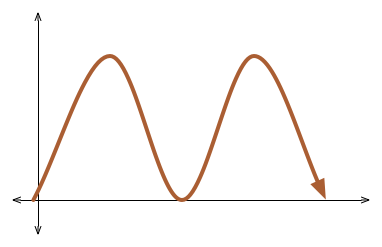Feelin' sixey
 The average distance of a point lying on
y
=
sin
6
x
from the
x
-axis in a fundamental period can be expressed as
b
a
, where
a
and
b
are coprime. Find
a
+
b
.
The average distance of a point lying on
y
=
sin
6
x
from the
x
-axis in a fundamental period can be expressed as
b
a
, where
a
and
b
are coprime. Find
a
+
b
.
The answer is 21.
This section requires Javascript.
You are seeing this because something didn't load right. We suggest you, (a) try
refreshing the page, (b) enabling javascript if it is disabled on your browser and,
finally, (c)
loading the
non-javascript version of this page
. We're sorry about the hassle.
3 solutions
We're trying to find
n → ∞ lim n 1 i = 0 ∑ n sin 6 ( n i π )
This is a Riemann sum, so we express it in integral form:
π 1 ∫ 0 π sin 6 x d x = π 1 2 × 4 × 6 1 × 3 × 5 × π = 1 6 5
Can you explain how you evaluated that integral in just a single step?
Log in to reply
By using walli's reduction formula... Or by beta gamma function
For positive integer n ≥ 2 ,
∫ sin n x d x = ∫ cos n x d x = n ! ! ( n − 1 ) ! ! × ( 2 π ) ( n + 1 ) m o d 2
To prove this, start with ∫ sin n x d x = ∫ sin n − 2 x ( 1 − cos 2 x ) d x , and apply Integration U-substitution - Trigonometric . This is a common Reduction formula trick .
I integrated manually using sin3x formula..it was pain in ass..
The catch is integrating (sinx)^6 from 0 to pi......this can be done easily using Beta Function.......
All we have to do is just to find the "average" of this function and we can do it without using "really" integrate
first we change this function to other form
sin 6 ( θ ) = ( sin 2 ( θ ) ) 3
( 2 1 − cos ( 2 θ ) ) 3 = 8 1 − 3 cos ( 2 θ ) + 3 cos 2 ( 2 θ ) − cos 3 ( 2 θ )
8 1 ( 1 − 3 cos ( 2 θ ) + 2 3 ( 1 + cos ( 4 θ ) ) + 4 − 3 cos ( 2 θ ) − cos ( 6 θ ) )
and we know that average of sine and cosine function is 0,so
< s i n 6 ( θ ) > = 8 1 ( 2 5 ) = 1 6 5
then 5 + 1 6 = 2 1 . . A n s